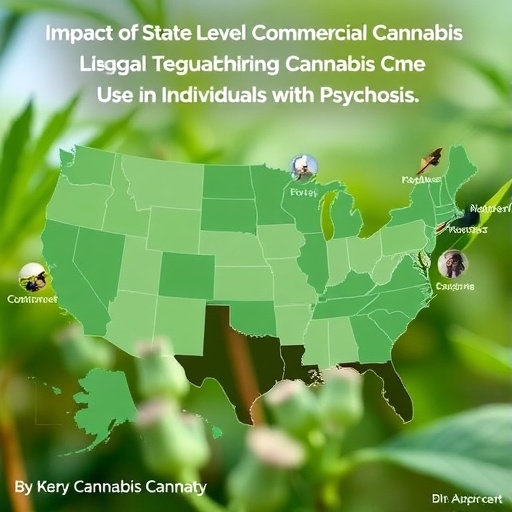In a groundbreaking investigation recently published in JAMA Psychiatry, researchers have documented a substantial increase in cannabis use among individuals diagnosed with psychosis following the legalization and commercialization of cannabis within their states. This study emphasizes a critical public health concern, revealing that this vulnerable population exhibits a surge in cannabis consumption that surpasses previously observed increases within the general population. The findings raise profound implications for policymakers and healthcare professionals aiming to mitigate the adverse effects of cannabis on mental health outcomes.
The methodology employed in the study involved longitudinal assessments and structured interviews to quantify changes in cannabis usage patterns among people living with psychotic disorders. By leveraging state-level policy shifts as a natural experiment, the researchers meticulously compared cannabis consumption rates before and after the enactment of legalization and commercialization laws. This rigorous approach allowed for the isolation of policy impact from confounding factors, thereby providing robust evidence of a direct association between regulatory changes and increased use in this psychiatric cohort.
Cannabis, while often discussed in contexts of recreational use and medical potential, poses unique risks to individuals experiencing psychosis due to its psychoactive properties—most notably Δ9-tetrahydrocannabinol (THC). THC’s interaction with the endocannabinoid system can exacerbate psychotic symptoms, reduce treatment adherence, and complicate the illness trajectory. The escalation in cannabis use documented herein amplifies concerns about illness course destabilization, relapse rates, and increased demand for intensive health services, underscoring the need for targeted regulatory frameworks.
Crucially, the study’s findings highlight gaps in existing cannabis policies that inadequately address vulnerable subpopulations, such as those with pre-existing psychiatric conditions. Current policy instruments focusing broadly on population-level harm reduction, including taxation, advertising restrictions, and potency controls, may not sufficiently mitigate the amplified risks faced by individuals with psychosis. The authors call for regulatory measures tailored to curtail access and exposure among this group, including stricter potency limits and enhanced health warnings specific to psychotic disorders.
Advertising and commercialization strategies have been shown to influence cannabis uptake through increased product visibility and social normalization. The study implicates aggressive marketing as a driving force behind increased consumption among individuals with psychosis, suggesting that regulatory constraints on promotional content should be a vital component of public health interventions. Control over marketing narratives and the dissemination of scientifically grounded health information could mitigate some of the lure and misperceptions surrounding cannabis use.
From a neurobiological perspective, cannabinoid compounds modulate neurotransmitter systems implicated in psychosis, such as dopaminergic and glutamatergic pathways. The heightened cannabis use post-legalization introduces complex challenges in psychopharmacological management and symptom stabilization, given the bidirectional influence of cannabinoids on neural circuits. This underscores an urgent need for clinicians and researchers to develop integrated treatment protocols that address concurrent cannabis use and psychotic disorders more effectively.
Health service utilization patterns among this cohort point to increased emergency department visits, hospitalizations, and more frequent psychiatric interventions following cannabis legalization. These trends impose significant burdens on mental health infrastructure already strained by resource scarcity. The study advocates for comprehensive health policy reform incorporating preventive strategies, early intervention programs, and enhanced funding to support mental health services tailored to those affected by cannabis-related exacerbations.
The socio-political ramifications of these findings extend beyond clinical boundaries, prompting reconsiderations of cannabis legalization’s broader societal impact. Legal systems and public health agencies must reconcile the economic drivers of cannabis commerce with the imperative to protect at-risk populations. Policy frameworks balancing tax revenues and commercial interests against public health priorities are essential to craft sustainable, ethically responsible cannabis regulations.
An epidemiological lens reveals that increased cannabis use in psychosis can propagate population-level consequences, potentially raising the prevalence and severity of psychiatric illnesses. This necessitates robust surveillance systems to monitor usage trends and health outcomes post-legalization continuously. Data-driven policy adaptation can ensure emerging risks are swiftly addressed to safeguard public health.
Further research is warranted to elucidate the mechanisms underpinning increased cannabis use among individuals with psychosis post-legalization. Studies exploring psychosocial determinants, genetic susceptibilities, and the role of cannabis product diversity—including potency and delivery methods—will provide nuanced insights essential for tailored interventions. Cross-disciplinary collaboration between neuroscientists, mental health experts, and policymakers will be pivotal in advancing this agenda.
In sum, this study provides a compelling and urgent call to action, urging regulators to incorporate nuanced, evidence-based policies that recognize the heightened vulnerability of individuals with psychosis to cannabis-related harm. It stresses the importance of personalized health warnings, potency restrictions, and marketing limitations to attenuate the negative impact on this sensitive population. The intersection of mental health and cannabis policy demands sophisticated, multi-layered strategies to foster safer environments as legalization trends continue globally.
The research represents a vital contribution to the discourse surrounding cannabis legalization’s impacts, serving as a foundational reference for future investigations and policy formulation. By illuminating the disproportionate effects on individuals with psychosis, the study challenges stakeholders to rethink existing regulatory paradigms and prioritize mental health in the evolving cannabis landscape.
Subject of Research: The impact of cannabis legalization and commercialization on cannabis use patterns in individuals with psychosis.
Article Title: [Not Provided]
News Publication Date: [Not Provided]
Web References: [Not Provided]
References: (10.1001/jamapsychiatry.2025.2539)
Image Credits: [Not Provided]
Keywords: Cannabis, Psychosis, Legal system, Advertising, Population, Commerce, Health care policy




